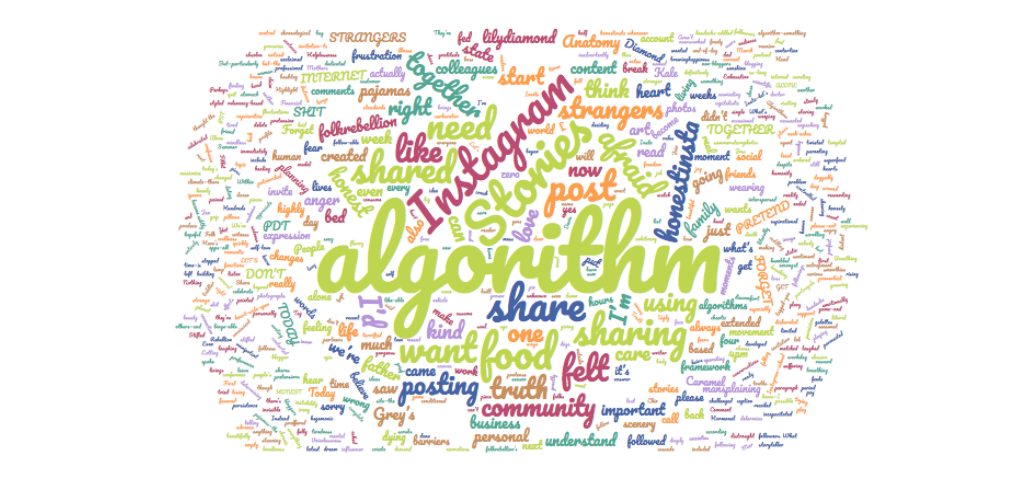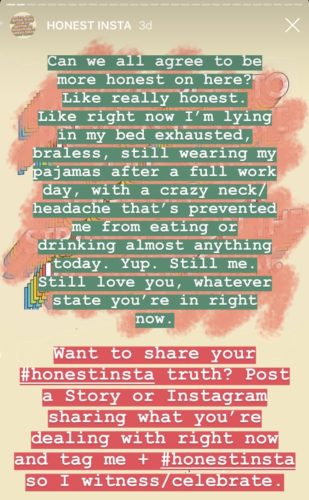
On Monday at 4pm, I was in a sorry state. I was suffering from one of my chronic head- and neck-aches, which, when they’re particularly pernicious, leave me nauseated and incapacitated, a sorry, pained lump of human. I was wearing pajamas—the same pajamas I’d been wearing the night before, which I wore right on through my workday. By four pm, I hit a wall of headache and nausea too big to lob myself over, and I crawled back into bed. A binge-able new season of Grey’s Anatomy and some mindless Instagram scrolling were just what the doctor ordered.
But then I saw this meme. I know—I didn’t think I’d ever start the sentence of a serious paragraph thus, but this is my truth. My friend Summer shared this meme, created by a woman named Jess Davis on her account @folkrebellion. Here’s what it said: DON’T FORGET TO PRETEND TO HAVE YOUR SHIT TOGETHER FOR STRANGERS ON THE INTERNET TODAY.
Don’t. Forget. To pretend. To have your shit together. For strangers on the internet. Today.
I laughed, at first. It cut deep. And then I stopped laughing and I felt a hot hand of anger start to grip in my stomach. It was the same anger I felt when I noticed myself contorting what I shared on social media to try to please—not myself, not my family or friends, not even my audience, really, but—the algorithm.
My father was visiting a few weeks ago, and after a Fitbit customer support phone call that ended with the agent mansplaining the problem my father was having by way of “the algorithm”, my dad exclaimed: “‘Algorithms’ is the latest answer for everything because nobody knows what the f*^k they actually are.” And while I’m sure there’s some very scientific mansplaining to be done on the topic of the omnipotent, omniscient algorithm, I’m going to have to side with my father on this one.
We have all become slaves to various algorithms, the functions of which we can neither see nor fully understand. The music we listen to, the media we consume, the pillows we buy, the food we eat, heck, even the romantic partners we’re matched with on dating apps—all are now controlled by invisible algorithms. It’s a sneaky kind of entrapment. We love the algorithm because it gives us what we think we want. Yet the algorithm is also determining what we want for us—long before we’re aware of its actions.
In March 2016, Instagram changed its algorithm from being chronological to being relevancy-based, claiming that the algorithm could determine “the moments we believe you will care about the most.” Instead, both personal and business users recoiled from the changes. And though recent algorithm shifts claim to reprioritize based on your personal preferences, I haven’t yet seen these effects. In the past week alone, several colleagues in the world of food and wellness blogging came to me distraught over the algorithm: The algorithm wasn’t showing their posts to their followers. The algorithm wasn’t rewarding the kind content they were posting. The algorithm favored one content creator over another. What could we do about the algorithm?
Nothing. And yet.
Me, my colleagues, those of us who make our livings on the internet, we are, in a strange and entirely literal way, living and dying by the algorithm. We cannot, in other words, afford to ignore it, to scoff at it, because we also rely on it to pay the rent. The algorithm—something we cannot control, see, understand, or count on to remain steady for any period of time—is the emotionally abusive boss we just can’t quit trying to please.
As the fear of living and dying by the algorithm permeated our community, I found myself growing increasingly distant from my work. I saw colleagues obsess for hours over their Instagram feeds, planning out posts weeks in advance to maximize beauty. I was tempted to start planning myself, but spending so much time curating didn’t feel right. Did I want my Instagram account to be a gallery of highly curated images, none of which spoke to what I was experiencing in the moment? Perhaps that worked well for others—and I celebrated that. But at the end of the day, this kind of contortion left me feeling empty. Stifled.
Even when I tried to play the game, sharing what I thought the algorithm would reward (beautifully styled seasonal produce, superfood smoothies, sexy galettes, stunning scenery, and the like), I’d still lose followers. What was before a joyful expression of creativity and community now felt like a twisted zero sum game—and I was losing interest in playing. Over time, I became subtly yet keenly afraid to post anything other than food. And while food is an important part of my life, it’s just one slice of the proverbial pie.
First and foremost, I’m a storyteller. I love telling stories through and around food, and I always will. But—particularly in today’s sociopolitical climate—there are many stories I want to tell that are about much more than food. Stories of loss and confusion. Stories of honesty and reunion. Stories of loneliness and connection. Stories of the planet rising and falling to meet human demand. Stories of how we are each making our way in a deeply chaotic world. These narratives are important to me, and as a writer, I need to share them.
I care greatly about the readers I’ve developed relationships with on Instagram and on my site—the folks who “follow” me and read my words and watch my Insta Stories and appreciate my art. They’re a kind of extended family, a network of, yes, strangers, but strangers who are also community. I know many of you by name. I love you. You are the beating heart and soul of all that I do. And it felt wrong to be afraid to share the ideas and conversations I care about most with this extended family, beyond the occasional conversation about politics, grief, death, and self-love.
The stronger I felt that something was wrong, the more I asked myself what it was I actually wanted. I challenged myself to put it in writing, and here’s what came out: I want there to be zero distance between what’s most important to me and the work that I do and share every single day. I want all that I share to be a full and complete expression of what I care about most.
And that meant, definitively, not giving a damn about the algorithm. But, dear reader, I was afraid.
I wasn’t so much afraid that I would inadvertently crash and burn this vehicle of a business I’d built from the carburetor up—no, I was more afraid of the unknown on the other side of the algorithm. I’d grown so conditioned to deciding what to post next based on an arbitrary framework I didn’t even understand that the idea of operating outside that framework terrified me. If I wasn’t posting beautiful photos of food three to four times a week, interspersed with photos of gorgeous scenery and curated images of myself, what was I posting?
Which brings me back to Monday. In bed at 4pm. In my pajamas. Ugly crying over Grey’s Anatomy and feeling fed up with all the barriers of pretense one must erect in order to remain, literally, like-able and follow-able on social media. In a flurry of frustration, I shared that meme on Stories, and offered the invitation below:

I followed it up with a picture of me in my disheveled state, using the hashtag I’d proffered. Within moments, a half dozen people had posted Stories of their own using #honestinsta. I quickly put together a static post (below) that included this invitation—to break the barriers of posting according to what we think the algorithm wants, to create real community amongst strangers by way of sharing our honest truth in the moment. The irony of using a highly curated image of myself is not lost on me, and I pointed that out in the caption below.
What followed was a cascade of #honestinsta truths. Hundreds of comments sharing challenges and frustrations—both in people’s personal and professional lives, and on Instagram—echoed the sentiment of being stifled in these limited portrayals of life. I watched as bloggers with large followings shared the inner workings of their current state. Some later chose to delete their comments. And then came the heart-wide-open Stories and posts from non-bloggers. People who look at the aspirational content on Instagram and assume that’s what life is always like for that blogger, influencer, actor, or model. Mothers overworked at home and on the job. People breaking through fears of sharing their anxieties and challenges with mental illness. Financial instability. Chin hairs. Hormonal fluctuations. Exhaustion. Helplessness in the face of political chaos. Voicelessness.
I created a Story Highlight on my Instagram profile to include all the shares in which I was tagged—you can read through them yourself.
Over the next couple days, people began to refer to #honestinsta as a movement. I’m humbled. I hope this movement lives long, unwinding the discomfort of all the ways we have contorted ourselves, societally and personally, in order to please hegemonic (patriarchal, capitalistic, heteronormative, the list goes on) standards.
I’d like to invite you to share your own honest experience using #honestinsta whenever you’re on the ‘gram, and especially on Mondays, when I’m going to share a dedicated #honestinsta post each week. Join me.
Let’s keep going towards the truth.



